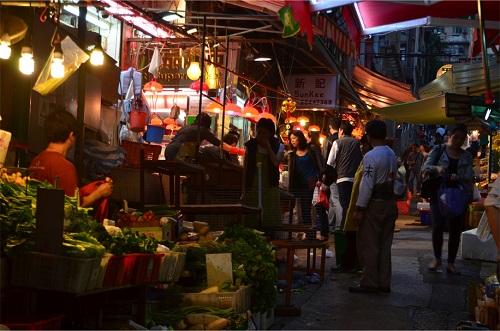James Louie
Hong Kong

At the market – gaai sí
Although it can often sound like a constant disagreement to non-speakers, Cantonese is playful, witty, and at times, a poetic language. In Hong Kong the spoken word evolves notoriously quickly, suffused with waves of new expressions that come and go with the seasons. As a result, being away for a few years can have the effect of drawing baffled looks.
In my time of living here, I've had my fair share of language mishaps; one of them involved the sudden realisation that daai beng did not refer to a “big biscuit” at all, but a chunky five-dollar coin. The terms I've outlined below are in constant use, universally understood throughout all ages and strata of Hong Kong society. These are the ones that will most probably never fall out of fashion
- The Essentials
Wei! = “Hey!”; feel free to stretch it out when you bump into someone you know (waaaaaaayy!)
(Néi) déem ah? = How are you? / What's happening? / What's up?
Aiya! (or more accurately, aiiiiyaaaaaaaaaah!) = emphatic way of saying “oh no!”; used to express shock or dismay in a wide variety of situations
Fai dee lâh! = Hurry up! Get a move on!
Déem shuen ah? = What are we going to do now?
Wah! = the Cantonese way of saying “wow”; often accompanies multimillion-dollar fireworks displays over the harbour.
Mm gôi (you shouldn't have) = the most common way of saying “thank you”. When you get served at a restaurant or hotel, when you are in a taxi or a bus, or when someone opens the door for you (rare in Hong Kong) this is the one you should use.
Doh zeh (many thanks) = used when someone gives you a gift; invites you out; pays for your meal
- For Fun
Sor gûa! (silly melon) = fool; idiot!
Sor jûe! (silly pig) = silly boy/girl; a term of endearment
Yum gung = poor; pitiful; luckless
Chuen (inch) = arrogant; cocky (sometimes jokingly so)
Síng muk (awake, open-eyed) = intelligent; clever; showing initiative
Lek jái / lek núi = smart guy / smart girl
Leng jái / leng núi = good-looking guy/girl; beware the gentle dipping tone on the first syllable – say it wrong and you’ll tell the person they’re a punk!
Zeng! (proper, right) = cool; awesome!
Chui shúi (blowing water) = to chat; talk bull
Tau gai (to steal a chicken) = to slack off; cheat; be lazy
Sái céen (to wash money) = to spend money
Siu yeh = midnight snack; a well-loved pastime of nocturnal city-dwellers.
Sing daan ló yun (Christmas old guy) = Santa Claus
- East meets West
Much to the chagrin of language purists, 156 years of British rule have left their mark on Hong Kong Cantonese. Even today, English is still seen as a language of prestige and a tongue of the educated. For this reason it is totally acceptable to throw in a few English words into a Chinese sentence, and vice versa. Three simple examples are:
As faai as possible = as quick as possible
Book toi = Book a table
Send gor message = send a message
The upside is that this is perfect for those of us who have a limited repertoire of Cantonese words. Now you know how to steal a chicken!